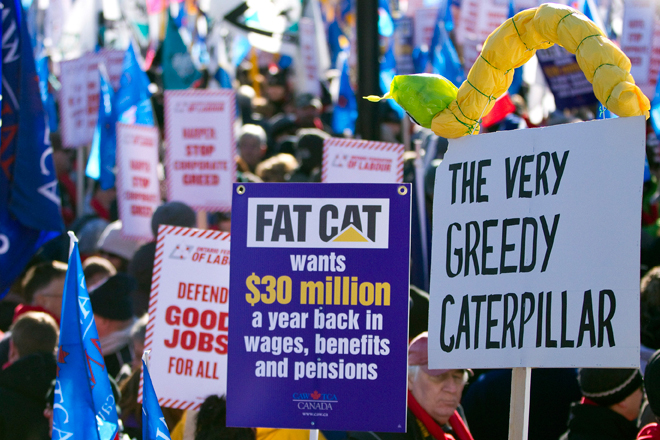It did not take more than a quick glance through the headlines Monday to sum up the last 40 years of brutal U.S. economic trends. In the New York Times, David Leonhardt announced the debut of a series titled “A Closer Look at Middle-Class Decline.” Meanwhile, the Associated Press reported that “U.S. Poverty Heads Toward Highest Level in 50 years.” And New York Times ace labor reporter Steven Greenhouse provided the final punch to the solar plexus, “At Caterpillar, Pressing Labor While Business Booms.”
The numbers are grim and outrageous.
- Leonhardt: “Since median inflation-adjusted family income peaked in 2000 at $64,232, it has fallen roughly 6 percent. You won’t find another 12-year period with an income decline since the aftermath of the Depression.”
- AP: “The Associated Press surveyed more than a dozen economists, think tanks and academics, both nonpartisan and those with known liberal or conservative leanings, and found a broad consensus: The official poverty rate will rise from 15.1 percent in 2010, climbing as high as 15.7 percent. Several predicted a more modest gain, but even a 0.1 percentage point increase would put poverty at the highest level since 1965.”
- Greenhouse: “Despite earning a record $4.9 billion profit last year and projecting even better results for 2012, the company is insisting on a six-year wage freeze and a pension freeze for most of the 780 production workers at its factory here [Joliet, Ill.]
The significance of these numbers should transcend the political bickering over which party should be blamed for the slow recovery from the great financial crisis. The forces responsible for growing poverty, rising income inequality and the steady withering of organized labor have been in place for decades — and were aided by both parties. Globalization, technological progress, Washington’s political capture by corporate special interests, regressive changes in the tax laws — for 40 years the millstone has been grinding away.
Caterpillar’s example is especially instructive. The maker of construction and mining machinery is now largely immune to the ebbs and flows of the U.S. business cycle. For several years now, the company has generated the majority of its revenue from overseas sales: The booming economies of China, India and Brazil have been gobbling up earth movers like Tic Tacs. Caterpillar’s shareholders and executives have profited enormously from the maturation of these emerging economies. But the company sees no need to spread the wealth to its workers. And why should it? Caterpillar owns all the leverage. If American workers prove too obstreperous, China would be happy to accommodate Caterpillar’s state-of-the-art manufacturing facilities across the Pacific. Caterpillar’s stinginess in Joliet offers a perfect demonstration for how globalization contributes to rising income inequality in the United States.
The obvious way to redress this miserable state of affairs is to tax the hell out of Caterpillar’s overseas profits and executive salaries and use that cash to pay for an expansion of the safety net that would cushion the dual blow of globalization and technological modernization. Indeed, the spiking poverty rates of the past few years would be inflicting far greater harm were it not for the government aid programs currently in place — food stamps, unemployment benefits, Medicaid. Yet every single one of those problems is under sustained attack. The most likely scenario for the future includes little hope of raising taxes, and high likelihood of severe cuts to government services.
Which means every single trend highlighted above will just get worse.

